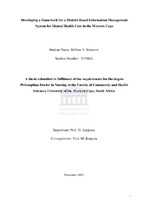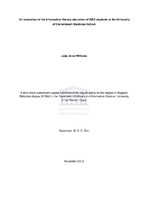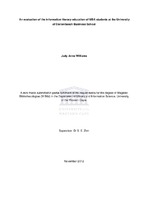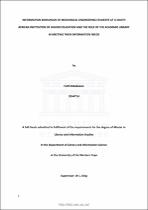| dc.description.abstract | A review of the literature has shown that there is a lack of mental health information on
which to base planning of mental health services and decisions concerning programme
development for mental health services. Several studies have indicated that the use of an evidence-based health information system (HIS) reduces inappropriate clinical practices and promotes the quality of health care services. This study was aimed at developing a framework for a district-based mental health information management system, utilising the experiences of health care providers and caregivers about a district mental health information system (DMHIS). Activity Theory was used as the philosophical foundation of the information system for the study. A qualitative approach was employed using semi-structured individual interviews, Focus Group Discussions (FGDs), systematic review and document analysis. The intervention research design and development model of Rothman and Thomas (1994) was used to guide the study, which was conducted in the Cape Town Metropole area of the Western Cape. A purposive, convenient sampling method was employed to select study participants. Ethical clearance for the study was obtained from the University of the Western
Cape, and permission to use the health facilities from the Department of Health.
The data collection process involved 62 individual interview participants, from mental health nurses to district health managers, health information clerks, and patient caregivers/families and persons with stable mental conditions. Thirteen caregivers took part in the FGDs. Document review was conducted at three community mental health centres. The data were analysed manually using content analysis. Core findings of the interviews were lack of standardized information collection tools and contents for mental health, information infrastructure, capacity building, and resources. Information processing in terms of collection, compiling, analysing, feedback, access and sharing information were the major problems. Results from document analysis identified inconsistencies and inaccuracies of information recording and processing, which in turn affected the quality of information for decision making. Results from the systematic review identified five functional elements: organizational structure; information infrastructure; capacity building; inputs, process, output and feedback; and community and stakeholders’ participation in the design and implementation of a mental health information system (MHIS). The study has contributed a framework for a DMHIS based on the findings of the empirical and systematic review. It is recommended that there is a need to establish a HIS committee at district health facility level for effective implementation of the framework and quality information processing. There is a need to ensure that staffs have adequate knowledge and skills required for effective implementation of an information system. It is recommended that higher education institutions include a course on HISs in their curriculum. It is suggested that the South African Mental Health Policy be reviewed to include an MHIS and ensure involvement of the community and stakeholders in this system as well as adequate budget allocation. | en_US |




